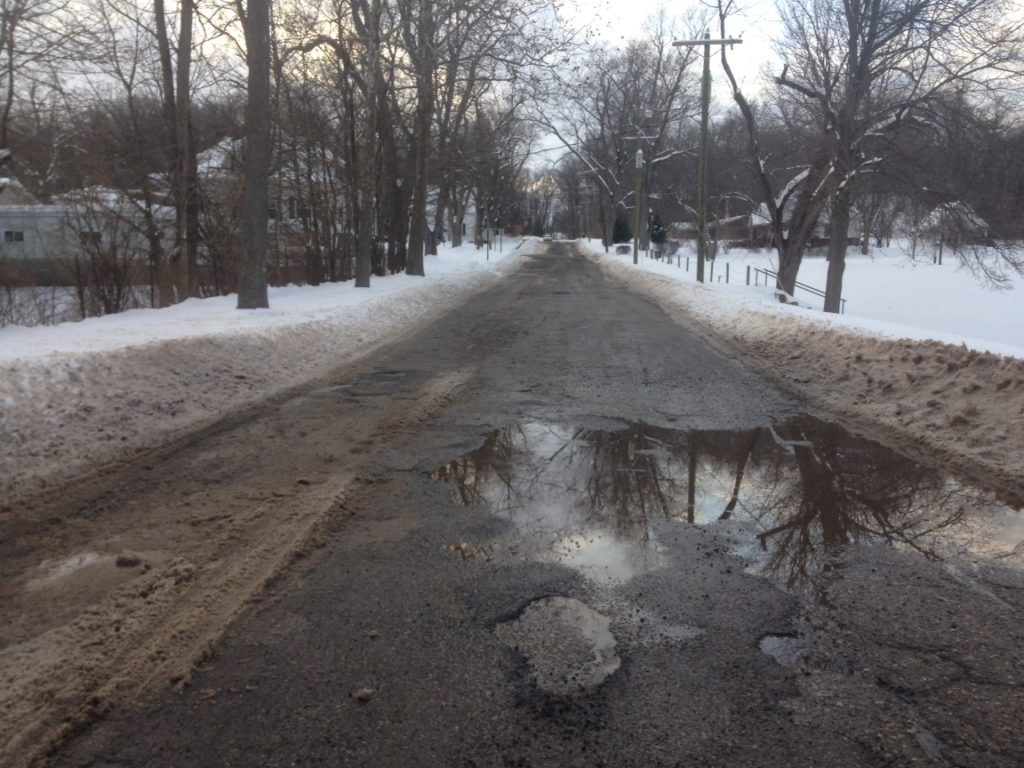
In south-central Michigan, where roads and broadband remain a top priority, Hillsdale is the kind of city President Donald Trump’s infrastructure investment plan is meant to benefit.
Trump’s plan intends to use $200 billion in federal money to spur more than $1 trillion in local and state government and private investments to fix America’s infrastructure, according to a White House fact sheet. The plan tabs $50 billion for rural infrastructure, $20 billion for expanded loan programs and private bonds, $20 billion for what Trump calls “transformative projects,” and $10 billion to the Federal Capital Revolving Fund.
“Modernizing and investing in our nation’s infrastructure is long overdue, and I’m glad President Trump’s plan pays a great deal of attention to helping rural communities,” Rep. Tim Walberg, R-Michigan, said in a statement. “In particular, expanding broadband deployment to rural areas is important so that residents are connected and can enjoy greater economic productivity and higher quality of life.”
The Rural Infrastructure Program would allocate a bulk of the dollars to state governors, while the remaining funds would be distributed through rural performance grants, a fact sheet outlined.
Walberg echoed the plan’s shift of authority to the local and state level.
“It is also important to return more decision-making power to state and local officials who are better equipped to manage resources in their communities than Washington, D.C., bureaucrats,” Walberg said.
State Rep. Eric Leutheuser, R-Hillsdale, said Lansing is looking into pulling incremental funding together specifically for additional road repairs this year.
“I think every well-managed state is looking for ways to accelerate their infrastructure investments, because the costs only go up over time,” Leutheuser wrote in an interview with The Collegian.
He emphasized the importance of these partnerships, referencing the way unfunded pension liabilities affect infrastructure investments.
“We do need the proverbial ‘all hands on deck,’ because the need to is so great,” Leutheuser wrote. “Resources are increasingly dedicated to social safety net programs, while time marches on, leaving much of our infrastructure at or past its engineered lifespan.”
While around 50 percent of the city’s budget goes to payroll and benefits, about 83 percent of those pensions are funded by property taxes. According to City Manager Dave Mackie, Hillsdale is in pretty good shape compared with some other Michigan communities.
For Hillsdale, the biggest impediment to infrastructure boils down to cost, and Mackie said the city is hopeful the federal money makes its way down to the local level as Hillsdale qualifies for block grants that focus on communities with a low-to-moderate income population.
“If Trump’s infrastructure plan makes its way down to the local level, we’ll definitely look to take advantage of that funding to do more in the community,” Mackie said.
In Hillsdale, 31 percent of residents fall under the federal government’s poverty line, according to Mackie. This is not something to tout, Mackie said. On the other hand, it qualifies Hillsdale for federal and state resources because it means that the city has lower taxable values on properties and homes and is not collecting as much on its taxbase without needing assistive grants.
For example, the city is working with the Board of Public Utilities to fix Garden, Vine, Mead, Rippon, and Spring streets. The project, slated to begin in April, should costs $2.8 million, and Mackie said, wouldn’t have been feasible if the city didn’t receive a $1.9 million Community Development Block grant issued by the federal government and administered by the state government.
Since the bids were higher than anticipated, the council is still in the financing stage but intends to complete the project, he said.
Additionally, the city council found two sources of revenue that could be allocated to just road projects, including the payments in lieu of taxes from the BPU. The board will also contribute their services: For water and sewer projects, the group would replace water and sewer mains or electrical lines, while the city would pay for sidewalks and stormwater drains.
Although roads remain the biggest priority, broadband is getting attention, too. Mackie said Michigan Gov. Rick Snyder’s statewide goal is to promote high-speed internet, giving the state a competitive advantage in both rural and urban areas.
According to Mackie, the city is forming a fiber broadband committee to determine how best to capitalize on existing broadband and how to extend it to residents and businesses. The existing broadband forms a ring around a certain portion of downtown and some residential areas, connecting the county offices, Hillsdale College, and some local businesses, but is underutilized.
Since it’s tough to justify putting fiber in a smaller community because the customer base can’t support it, Leutheuser said in the meantime, other barriers to expansion need attention, such as competing interests, priorities, and regulations.
Ultimately, Trump’s plan aims to spur investment rather than use federal money to fund the bulk of projects. Cities such as Hillsdale will have access to block grants, but will need to rely more on financing themselves and seeking state and private investment.
“We’re being very aggressive in setting aside monies now,” Mackie said, “monies that weren’t set aside in the past that are dedicated specifically to road repair. I feel over the next five to 10 years, the city will be making strides.”

